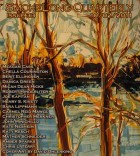The story seems to me to be an obvious reference to Peter Pan. Can you talk a little about that? Do you intend it to be a retelling of some sort? Or more of an homage? Or something totally different?
I guess it’s more of an exploration than anything else, into a small facet of the story that interests me most. I’ve always been fascinated with the story of Peter Pan and the way that the interpretations of it swing so wildly between sweet and savage, between cruel and childlike, almost saccharine in its sweetness. The movie is bizarrely disconnected from the book, the musical slightly more faithful but equally bizarre. I love the way the story uses the wild nature of children to mirror the wild nature of the world, and our own animal nature. Children are really just little beasts, right? In the best, id-like sense of the word, I mean.
I like the different voices in this piece. Did you intend the story to be that way when you started writing it, or did that just happen as you went along?
I actually intended to write the whole thing from the Lost Boys’ collective voice, but then I thought—where is Wendy in all of this? What kind of jerk am I that I can’t give her a voice? And then it just developed from there.
Where is Captain Hook?
I struggled with whether or not to include him, and Tiger Lily, and even the crocodile — but then I realized they weren’t really central to the story I was trying to tell. In a flash piece, of course, you have to strip your story down to the essential, and this was, at its heart, a story about the relationship between Peter Pan, Wendy, and Tinkerbell. That relationship, and even her role as mother to the Lost Boys, has always seemed weird and kinky and dark, and I wanted to explore that a little further. That side of things — the growing up and exploring your own sexuality side of things — seemed like a different story than the sort of wild-but-definitely-childlike fantasies that include playing at pirates and Indians.
Have you written other pieces based on children’s stories?
Kind of — I’ve written stories about mythical figures like Paul Bunyan and fairy tales and monster stories — though I guess not so much children’s stories as sort of archetypal stories, myth-making pieces. I’m definitely drawn to simple stories, whether for children or adults or both, because so much more can be done with language and with character in the spaces between the plot. And since the plots are already so familiar, there’s so much you can do to explore and twist and examine and deconstruct, and that’s what I really love about writing.
Why are you drawn to flash fiction?
I think it’s because flash fiction forces you to make every single word a diamond in your stories, since they’re so spare. You can’t have any loose, saggy prose, any extraneous elements or characters — it’s like the human body going into starvation mode: there’s no extra fat on it. There’s a hard kind of beauty in that. I started out writing poetry, so the transition to flash fiction was not as hard as it might have been to say, novels or long stories. It’s a very similar animal in many ways — you have to sock the reader in the face so they’ll remember your six hundred words. You have to really give them something golden.




 The core workshop of SmokeLong Fitness is all in writing, so you can take part from anywhere at anytime. We are excited about creating a supportive, consistent and structured environment for flash writers to work on their craft in a community. We are thrilled and proud to say that our workshop participants have won, placed, or been listed in every major flash competition. Community works.
The core workshop of SmokeLong Fitness is all in writing, so you can take part from anywhere at anytime. We are excited about creating a supportive, consistent and structured environment for flash writers to work on their craft in a community. We are thrilled and proud to say that our workshop participants have won, placed, or been listed in every major flash competition. Community works.